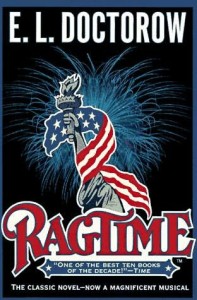Doctorow, E.L. (1974). Ragtime. New York: Penguin.
This impressionistic portrait of New York in the early 1900’s has been widely praised as a “classic,” and has been made into a movie and a Broadway show. I can’t understand the acclaim.
The story is roughly centered on the life of an upper-class family in New York, but dozens of other sub-stories flare up and die down around them. A rich socialite who married for money defends her husband who killed her lover, a famous architect. For no reason at all, she takes up with an impoverished Jewish immigrant and his daughter. Anarchist Emma Goldman appears and “liberates” her from her corset. Harry Houdini appears when he accidentally runs his car into the rich family’s yard. Sigmund Freud appears on his visit to Clark University in 1909. William Taft wins the presidency. Henry Ford has lunch with J.P Morgan. And so on, and on, and on,and on.
Toward the end of the (300-page) novel, a black man becomes enraged by an act of racial discrimination and finding no satisfaction in the legal system, turns to violence. That’s the only dramatic move in the entire novel, and it’s supposed to show America’s “loss of innocence” and rising awareness of racism. But that is pure nonsense, as anyone who knows anything about American history (and Black history) can attest. There never was an “age of innocence,” except among the profoundly ignorant, a condition that persists today.
I think the reader is supposed to be charmed, or possibly amazed, at the intermingling of fictional and historical characters. Maybe that was a literary innovation in 1975, I can’t remember. Most charitably, I can say this literary style has not aged well.
The writing is pedestrian. Quotation marks are dispensed with, so I guess that’s a sort of innovation, but the language is mundane, the narration predictable and the descriptions full of empty abstraction. There are few memorable scenes or turns of phrase, and there are so many characters, you can’t even remember them, let alone identify with any of them, so the emotional effect of the work is nil.
If you don’t know the social history of America during this period, it seems you would be mystified by all the random comings and goings. If you do know the history, you would be stupefied by its unimaginative recitation. Children might like the book because it gives easily digestible access to reasonably accurate history, though without insight.

